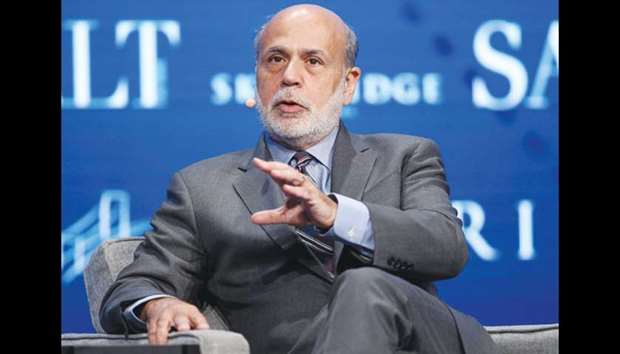Former Federal Reserve chairman Ben Bernanke said yesterday the Bank of Japan may need to coordinate a new fiscal spending plan with the government, allowing for inflation to accelerate above its 2% target without worsening the debt burden.
Making a temporary commitment to allow inflation to overshoot would help keep the ratio of debt to gross domestic product stable, and is different from directly underwriting fiscal spending, Bernanke said.
Bernanke also said the BoJ’s current policy framework may be reaching its limits because short- and long-term interest rates are near zero, but the need for more easing cannot be ruled out.
“The direct approach...would be for the BoJ to commit to a temporary overshoot of its inflation target sufficient to avoid any increase in the debt-to-GDP ratio,” Bernanke said.
“This commitment amounts to a monetary financing of the fiscal programme without relying on exotic concepts like helicopter drops.”
If inflation accelerated to 2% by next year, that would lower Japan’s debt-to-GDP ratio by 21%, Bernanke said.
Bernanke said there were several ways the BoJ could coordinate its policy with a new government spending programme, including committing to holding a certain amount of government debt for a fixed period.
There is a “strong case” for the BoJ to stick with its 2% price target, because this will pull interest rates further away from the zero lower bound, he said.
Bernanke spoke positively about Japan’s tight labour market, modest rises in wages and steady economic growth.
The BoJ’s yield curve control scheme, under which it buys government debt to keep 10-year government bond yields around zero, is a sustainable policy, because in the future the central bank will be able to manipulate yields with less purchases, he said.
However, fiscal and monetary policy authorities may need to closely coordinate policy in the future, because there is still a risk inflation does not accelerate, Bernanke said.
Although Japan’s economy has shown signs of a pick-up in recent months, consumer prices have not made a convincing recovery.
Inflation has been close to zero for almost two years, posing major policy hurdles for the BoJ’s ambitious 2% inflation target.
Bernanke said Japan’s ageing and shrinking population mean that its equilibrium interest rate, or the rate that neither stimulates nor constrains growth, is probably negative, which delays progress in achieving inflation.
Bernanke, who is currently a fellow at the Brookings Institution, spoke at a seminar hosted by the BoJ.

Bernanke: The BoJ’s current policy framework may be reaching its limits because short- and long-term interest rates are near zero, but the need for more easing cannot be ruled out.
